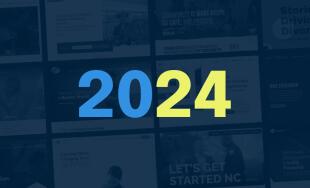HTML 5: Should we be excited yet?
Update 7/2/2009: I incorrectly credited Jeffrey Zeldman as the creator of HTML5 Doctor. Instead, the actual creators of the HTML5 Doctor website are Bruce Lawson, Rich Clark, Jack Osborne, Mike Robinson, Remy Sharp, and Tom Leadbetter as described at http://html5doctor.com/about/. This change has been made below.
It's an exciting time to be a web developer. The browser wars are in full swing, reminiscent of the mid-90s. Firefox 3.5 was released only yesterday with plenty of cool, new features including HTML5 support for audio, video, offline and local storage, and canvas text. Google's Chrome and Apple's Safari are blazing fast, already sporting cutting edge HTML5 features. The HTML5 draft specification, although years from completion, is already influencing web browser development and will revolutionize the way we develop for the World Wide Web. The future is here! But should we be excited yet?
Microsoft's Internet Explorer still boasts a 65% majority share of the web browser market as of May 2009, according to Net Applications Market Share1. Older versions of Internet Explorer are still very much in use: version 7 with 41%, version 6 with 17%, and version 8 with 7%. Only in Internet Explorer 8 did Microsoft provide near-complete CSS 2.1 support. But Internet Explorer 8 still falls far short of its competitors in terms of features and speed. Yes, Internet Explorer 8 makes our web development lives easier assuming we are content with CSS 2.1, and assuming Internet Explorer 6 and Internet Explorer 7 users choose to upgrade to Internet Explorer 8. But what about HTML5? What about CSS3? Forget about XHTML: it is a lost cause that can be directly credited to lack of development and Microsoft's refusal to support the standard in its Internet Explorer web browser. Even Dave Shea from Mezzoblue says HTML5-ready HTML 4.01 is the way forward2. Unfortunately, I fear the future of the World Wide Web is at Microsoft's discretion.
What Do We Do?
This is not a rhetorical question. I want to know what you think. Some suggest web developers begin charging for Internet Explorer 6 support. Andy Clarke proposes a bare-bones IE6-only style sheet that provides adequate support for the aging browser3. Others express a more blunt technique best described by John Gruber of Daring Fireball:
Firefox 3.5 is out, and, among a slew of major improvements, it now supports the HTML 5 <audio> and <video> tags. I don't post many video clips to Daring Fireball, but henceforth, when I do, it'll be with the <video> tag. IE users can suck it.
John Gruber - http://daringfireball.net/linked/2009/06/30/ff5
Still, my question remains unanswered: when should we get excited about HTML5 and CSS3? When will it be truly realistic to develop cross-browser compatible websites using these modern technologies? Even Microsoft has released online advertisements4 encouraging users to upgrade from "browsers several generations old
"... Microsoft, er, might you be referring to your Internet Explorer 6 web browser? Here is the Microsoft advertisement called "GRIPES" featuring Dean Cain of Lois and Clark fame.
This humorous and well-intended video is proof that even Microsoft wants users to ditch its Internet Explorer 6 and Internet Explorer 7 products in favor of its much-improved Internet Explorer 8 web browser.
Start Now!
We must usher in the future of web development. If your business model permits, drop support for Internet Explorer 6. Start learning HTML5. Jeffrey Zeldman Bruce Lawson, Rich Clark, Jack Osborne, Mike Robinson, Remy Sharp, and Tom Leadbetter have launched HTML5 Doctor, a website dedicated to teaching HTML55. O'Reilly says Google is backing HTML56. And Chris Wilson, platform architect of the Internet Explorer platform, says that Internet Explorer 8 will steadily increase its support for HTML5; Internet Explorer 8 already supports a few HTML5 features such as cross-document messaging, the window location hash, and network connection awareness7. As I see it, the problem we developers face is IE-users' slow adoption of Internet Explorer 8. As much as I dislike Internet Explorer, it is imperative that we encourage, coerce, or even force Internet Explorer 6 and Internet Explorer 7 users to upgrade to Internet Explorer 8. Only then can we really get excited about the future of the World Wide Web.
Learn More About HTML5
- HTML5 Doctor
- http://html5doctor.com/
- A List Apart's Preview of HTML5
- http://www.alistapart.com/articles/previewofhtml5
- Differences between HTML4 and HTML5
- http://dev.w3.org/html5/html4-differences/
- W3C HTML5 Draft Specification
- http://dev.w3.org/html5/spec/Overview.html
Footnotes
- http://marketshare.hitslink.com/browser-market-share.aspx
- http://mezzoblue.com/archives/2009/04/20/switched/
- http://www.forabeautifulweb.com/blog/about/universal_internet_explorer_6_css/
- https://www.youtube.com/watch?v=2aA_PEltVTw
- http://html5doctor.com/
- http://radar.oreilly.com/2009/05/google-bets-big-on-html-5.html
- http://www.sdtimes.com/content/article.aspx?ArticleID=31806


Comments
Rich Clark
Thanks for correcting Josh.
Also I don't think it's pointed out in your article but IE (even IE6) can be made to play nice with some HTML5 as pointed out by Remy in his first HTML5doctor article - http://html5doctor.com/how-to-get-html5-working-in-ie-and-firefox-2/
Cheers
Rich
Josh Lockhart NMC team member
@Bruce My apologies for the misunderstanding. I have corrected my blog article above. Thank you for such a great learning resource!
bruce
Zeldman hasnt launched HTML5doctor. I have (along with some friends). http://html5doctor.com/about/
Lewis Moten
Other browsers are often upgraded quicker because end-users are encouraged to upgrade them when they start the application (FireFox), or it is done in the background (Chrome). Internet Explorer depends on users going through the windows update process, which may not be setup for automatic updates anyway. If that were not enough, it adds an extra step requireing people to authenticate that their operating system is paid for. The other problem is that upgrading MSIE often breaks things anyway, so companies actively tell employees not to upgrade to cut down on support costs. As I see it, Microsoft is throwing a monkey wrench into it's own upgrade process and is passivly encouraging customers not to upgrade.
Josh Lockhart NMC team member
@sunstardave Well stated. I agree that the social network interplay will encourage browser vendors to implement better standards and technologies that support the growing social innovation on the web. I also agree that, if I were upgrading my grandmother's web browser, it would be to Firefox, Chrome, or Safari. I know this is a worn out argument, but many older users equate Internet Explorer with the Internet. Other IE6 users are corporations with large investments in the Microsoft platform. So *if at all possible*, I would encourage IE users to upgrade to Firefox, Chrome, or Safari. However, if they must continue using Microsoft's browser, then IE8 is not a bad choice at all. Thanks for your feedback!
sunstardave
Cross browser compatibility is incredibly archaic piece of baggage to deal with when compared to the successful explosion of Social Networking sites and how they all interplay so well with each other. I know we're still dealing with XHTML to facilitate that interplay (twitter on FB, Digg in blogs etc) but these entities are not fighting each other like a bunch of 80's businessmen.
I think an open field is good. I love FF but think Safari is by far the most most attractive browsing experience. Opera is also a great browser. Of course there are other worth noting.
I've stopped accommodating IE6 except where the demographic would be excluded without that support.
That being said, if I was to encourage people to upgrade their granny's browser, it wouldn't be to any of the IE browsers. Why bother, when so many other choices are available that whilst in competition, have demonstrated working toward a more common goal.
I do think that the interplay between Social Networking is raising the bar and will push for more uniformity in browser standards.
I hope anyway.
Great article by the way.
seyDoggy
With any luck HTML5 will move along faster then XHTML has been. The notion of HTML being more dynamic and less of a "stateless" language both excites me and scares me at the same time.
Leave a comment